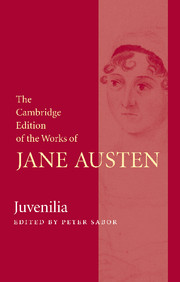Book contents
- Frontmatter
- Contents
- General editor’s preface
- Acknowledgements
- Chronology
- Introduction
- Note on the text
- Volume the First
- Volume the Second
- Volume the Third
- Corrections and emendations
- Appendix A The History of England: facsimile
- Appendix B Marginalia in Oliver Goldsmith’s The History of England, from the Earliest Times to the Death of George II
- Appendix C Marginalia in Vicesimus Knox’s Elegant Extracts . . . in Prose
- Appendix D Sophia Sentiment’s letter in The Loiterer, 28 March 1789
- Appendix E Continuations of ‘Evelyn’ and ‘Catharine’ by James Edward Austen and Anna Lefroy
- Abbreviations
- Explanatory Notes
The female philosopher
Published online by Cambridge University Press: 18 December 2020
- Frontmatter
- Contents
- General editor’s preface
- Acknowledgements
- Chronology
- Introduction
- Note on the text
- Volume the First
- Volume the Second
- Volume the Third
- Corrections and emendations
- Appendix A The History of England: facsimile
- Appendix B Marginalia in Oliver Goldsmith’s The History of England, from the Earliest Times to the Death of George II
- Appendix C Marginalia in Vicesimus Knox’s Elegant Extracts . . . in Prose
- Appendix D Sophia Sentiment’s letter in The Loiterer, 28 March 1789
- Appendix E Continuations of ‘Evelyn’ and ‘Catharine’ by James Edward Austen and Anna Lefroy
- Abbreviations
- Explanatory Notes
Summary
My dear Louisa
Your freind Mr Millar called upon us yesterday in his way to Bath, whither he is going for his health; two of his daughters were with him, but the oldest and the three Boys are with their Mother in Sussex. Though you have often told me that Miss Millar was remarkably handsome, You never mentioned anything of her Sisters’ beauty; yet they are certainly extremely pretty. I’ll give you their description.—Julia is eighteen; with a countenance in which Modesty, Sense and Dignity are happily blended, she has a form which at once presents you with Grace, Elegance and Symmetry. Charlotte who is just Sixteen is shorter than her Sister, and though her figure cannot boast the easy dignity of Julia’s, yet it has a pleasing plumpness which is in a different way as estimable. She is fair and her face is expressive sometimes of softness the most bewitching, and at others of Vivacity the most striking. She appears to have infinite Wit and a good humour unalterable; her conversation during the half hour they set with us, was replete with humourous Sallies, Bonmots and reparteés, while the sensible, the amiable Julia uttered Sentiments of Morality worthy of a heart like her own.
Mr Millar appeared to answer the character I had always received of him. My Father met him with that look of Love, that social Shake, and Cordial Kiss which marked his gladness at beholding an old and valued friend from whom thro’ various circumstances he had been separated nearly twenty Years. Mr Millar observed (and very justly too) that many events had befallen each during that interval of time, which gave occasion to the lovely Julia for making most sensible reflections on the many changes in their situation which so long a period had occasioned, on the advantages of some, and the disadvantages of others. From this subject she made a short digression to the instability of human pleasures and the uncertainty of their duration, which led her to observe that all earthly Joys must be imperfect.
- Type
- Chapter
- Information
- Juvenilia , pp. 216 - 217Publisher: Cambridge University PressPrint publication year: 2006



